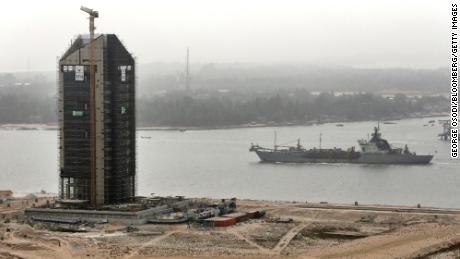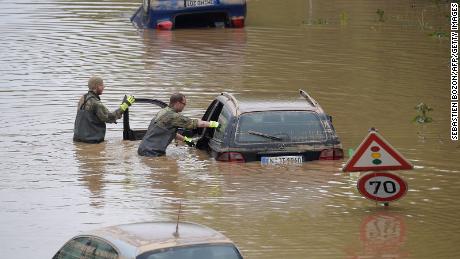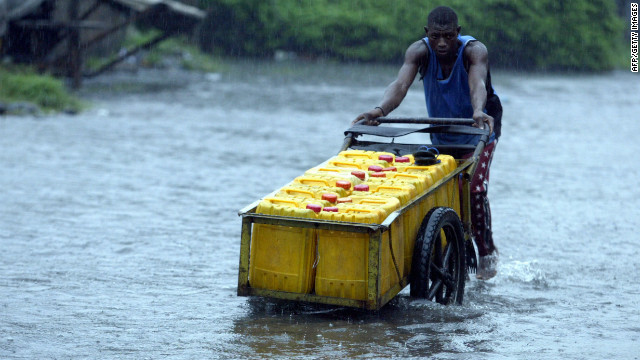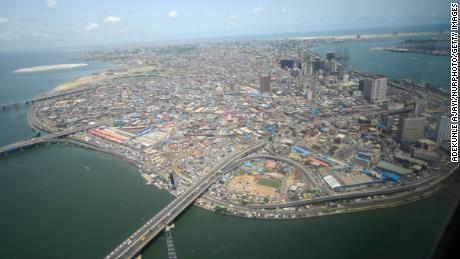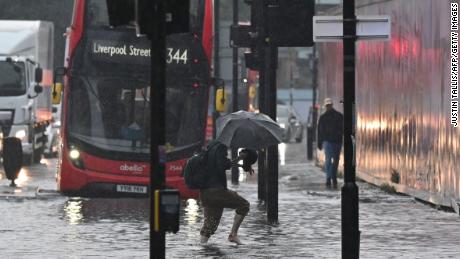Africa’s most populous city, home to more than 24 million people, may soon be unlivable as sea levels rise due to the climate crisis, experts warn
Welcome to Lagos during rainy season.
Residents of Nigeria, Africa’s most populous nation, are used to the yearly floods that engulf the coastal city during the months of March to November. In mid-July, however, the major business district of Lagos Island experienced one of its worst floods in recent years.
“It was very bad, and unusual,” Eselebor Oseluonamhen, 32 told CNN.
“I drove out of my house … I didn’t realize it had rained so much … There was heavy traffic on my route because of the flood. The more we went, the higher the water level. The water kept rising until it covered the bumper of my car … then there was water flowing inside my car,” Oseluonamhen, who runs a media firm on the Lagos mainland, recalled.
Eroding coastline
Lagos is partly built on the mainland and a string of islands.
Manzo Ezekiel, a spokesman for Nigeria’s emergency management agency (NEMA), told CNN that the riverbank of Lagos’ Victoria Island is already being “washed away … particularly in the V.I area of Lagos.” “There’s this problem of the river bank being washed away. The increase in water level is eating into the land,” Ezekiel added.
While the ambitious project could contribute to reducing housing shortages in other parts of the city, Ezekiel fears that “reclaiming land from the sea will put pressure on other coastal areas.”
Coastal cities at risk of being submerged
“As a result of heat-trapping pollution from human activities, rising sea levels could within three decades push chronic floods higher than land currently home to 300 million people,” the study said. “By 2100, areas now home to 200 million people could fall permanently below the high tide line,” it added.
Adebote told CNN that Lagos’ fate “would depend on how we prioritize this science prediction and what corresponding actions we take as a response.” “It is only a matter of time before nature pushes back and this could be a disaster,” he added.
Nigeria deadly floods
At least 69 people lost their lives in flood disasters last year. In 2019, more than 200,000 people were affected by floods with 158 fatalities.
“Every year we witness flooding in Nigeria. It is a problem that climate change has brought and we are living with it,” Ezekiel told CNN.
Beyond Lagos’ vulnerability to climate change, poor drainage systems and clogged street gutters in large swathes of the city are believed to have escalated its flooding challenges.
Keeping Lagos afloat
Adebote told CNN that for Lagos to stay afloat in the face of floods and rising sea levels, it must adapt to climate change.
“We need to look at our infrastructures — drainage systems, waste management facilities, housing structures … How resilient and adaptive are these infrastructures in the face of environmental pressures and when put side-by-side with our growing population?” he said.
“We look forward working with President [Joe] Biden and Vice President [Kamala] Harris. We have great hope and optimism for the strengthening of existing cordial relationships, working together to tackle global terrorism, climate change, poverty, and to improve economic ties and trade,” Buhari wrote in a January tweet.
But Adebote remarks that government responses to climate action “have been largely poor.”
“There is a lot that must be done and will take consistent and deliberate actions on the parts of various stakeholders for Nigeria to properly take climate actions, especially in adapting to the impacts that are already threatening our livelihood,” he added.
An environmental activist, Olumide Idowu, urged government authorities to partner with the private sector in order to boost funds to tackle the issues.
“Government should look at private sector partnerships in order for them to drive climate finance to solve the flooding issues,” Idowu told CNN.
Nigeria’s economy has struggled in recent years, shrinking financing for climate change and other critical sectors. Authorities are nonetheless still pledging to ramp up the country’s climate change response.
![]()




